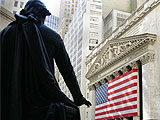The Continuation of History
24 Oct 2008
By Joseph de Weck for ISN
Paradoxically, after the fall of the iron curtain, the proponents of competition announced the end of the competition of ideas. If history was to be driven by ideas, then history was coming to an end. There was no credible alternative to neoliberalism anymore. In giving the West the economic and military superiority that forced the Soviet Union to accept capitulation, neoliberalism had ultimately ‘triumphed’.
The market fundamentalism of the ‘Washington-Consensus’ was an embodiment of this ideology; the invisible hand, the sum of all decisions of the individual economic actors, would lead us to a kind of capitalistic paradise. Perhaps a few corrections still had to be made at the margins - but on the whole there was no doubt that Ronald Reagan’s and Margaret Thatcher’s notion of liberalism represented the ultimate truth.
According to Hegel, progress and knowledge results from the juxtaposition of thesis and antithesis. The synthesis stands at the end of this process. Francis Fukuyama (“external pageThe End of History?call_made”) and others drew on Hegel to argue that the neoliberal dogma embodied the long-awaited synthesis, the final resting point of history. At universities economics began to be taught less as a social science and more as an empirical science. Economics was even believed to provide a credible source of ethics. Today, however, we have to come to the conclusion that neoliberalism is ‘just’ another idea, in Hegelian terms just another thesis in the onward march of history.
Ideas and conceptions of society usually bring about their own demise. Fascism found its end in its inhumanity and the irrationality of its allegedly rational actions. Communism found its Armageddon in the promises it could not keep and its excessive faith in the powers of the state. Neoliberalism shipwrecked due to its overly narrow and optimistic conception of man as a rational actor. This irony of history is proving fatal for a theory that puts the individual at the center of its arguments.
We are left with chaos and disillusionment. Necessity is the mother of invention and pragmatism is on the rise. Even politicians who were recently vocal liberal ideologues are no longer purely liberal, as the very Keynesian rescue packages in the US and elsewhere and the de-facto nationalization of the whole financial/banking system in the United Kingdom show. The market value of neoliberalism, which rests on the promise that free-market capitalism and democracy have the power to improve the world, is dropping faster than the Dow Jones.
China and Singapore did not take long to realize that the benefits of capitalism can be enjoyed even without the presence of a constitutional state. Instead of being the motor of a liberal world order, economic liberalism mutated to a life insurance for autocratic regimes. Neoconservatives in the Bush administration tried to hasten along the democracy they considered inevitable by force. Today Iraq stands as a huge monument against the idea that progress can be brought about by weapons and torture.
The bankruptcy of the neoliberal idea becomes even more evident when considering climate change, possibly the greatest challenge facing humankind. The problem of climate change reminds us that humankind has common interests greater than the sum of individual interests on which the market relies. Unregulated markets can endanger common goods such as the health of our shared environment. In the words of economist Claus Noé, “an economic system that is addicted to accumulation and growth cannot provide sustainability and a responsible use of our natural resources”.
Finally the current financial crisis teaches us another bitter lesson. Democratic systems cannot effectively deal with the forces that were unleashed by the free market. Economics dominated politics. Bill Clinton’s ‘it’s the economy stupid’ became dogma for politicians on left and right alike. In compliance with neoliberal theory, the state let go of its core competency – the control and arbitration function. What role do politics and even the state have to play in the future? They as well must reinvent themselves.
There is plenty of space now for new ideas and a new political vocabulary. History has not come to its end – and certainly not in the way Fukuyama imagined it. The search for a new synthesis, a new goal, starts again. We should hope that the rationalist ideas of the Enlightenment will remain the basis for any new theses that emerge. History may be cyclical and repetitive, but what is now clear is that history is a never-ending story.

